

Hotel Bar Sessions
Leigh M. Johnson, Jennifer Kling, Bob Vallier
A podcast where the real philosophy happens.
Episodes
Mentioned books

Jul 12, 2024 • 55min
The Sublime
The ocean and space and "Ode to Joy" are sublime, of course... but what about an excellent lentil soup?In a confusing twist of etymology, where one would expect "sub" to mean "below," in the word "sublime" it indicates something above or even beyond. We use it as a superlative, but a superlative of what?Edmund Burke argues that the experience of sublimity is related to fear in the extreme, even terror-- and Immanuel Kant's not far from this understanding-- so when someone says the lentil soup they're eating is "sublime," are they just making a category mistake? This week, the HBS hosts dig into the concept of the sublime, and test the limits of not only our imagination and understanding, but also language itself.Full episode notes available at this link:https://hotelbarpodcast.com/podcast/episode-144-the-sublime-------------------If you enjoy Hotel Bar Sessions podcast, please be sure to subscribe and submit a rating/review! Better yet, you can support this podcast by signing up to be one of our Patrons at patreon.com/hotelbarsessions!Follow us on Twitter/X @hotelbarpodcast, on Facebook, on TikTok, and subscribe to our YouTube channel!
★ Support this podcast on Patreon ★
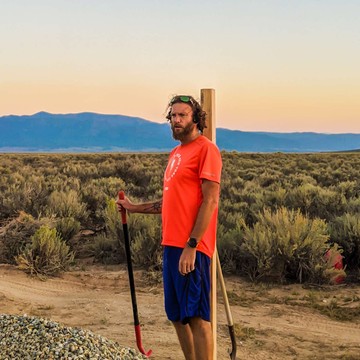
Jul 5, 2024 • 59min
Off-Grid Living (with Eric Mack)
What motivates people to live off-grid in the 21st C? And how hard is it to survive out there?This week, the HBS hosts are joined by journalist and co-host of the Our Uncertain Future podcast Eric Mack, who decided in 2020 to move his family "off-grid." Currently residing in a 100% water- and energy-independent compound in the New Mexico desert, Eric chats with us not only about the skills and resources necessary for making a home off the grid, but also his (and others') philosophical reasons for doing so. Full episode notes at this link:https://hotelbarpodcast.com/podcast/episode-143-off-grid-living-with-eric-mack-------------------If you enjoy Hotel Bar Sessions podcast, please be sure to subscribe and submit a rating/review! Better yet, you can support this podcast by signing up to be one of our Patrons at patreon.com/hotelbarsessions!Follow us on Twitter/X @hotelbarpodcast, on Facebook, on TikTok, and subscribe to our YouTube channel!
★ Support this podcast on Patreon ★
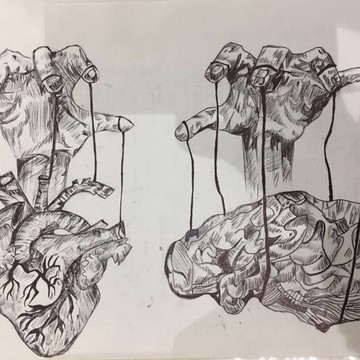
Jun 28, 2024 • 55min
Ideology
What, if anything, is the difference between having ideological commitments and belonging to a "cult"? This week's episode is a "deep dive" into the very deep waters of ideology and ideological commitments. A couple of important notes for listeners: first, this episode was recorded the day before William Clare-Roberts' excellent essay "Ideology and Emancipation: Voluntary Servitude, False Consciousness, and the Career of Critical Social Theory" was published. (We promise to do our level best to get him on the podcast for a Part 2 of this "Ideology" series!) Second, we are VERY excited to announce our new partnership with Edinburgh University Press, which is not only sponsoring this episode, but a number of other HBS episodes this season! EUP has generously offered our listeners a discount on their current catalog, so be sure to enter the discount code "HBS" when you buy books on their website! Full episode notes (and they are HEFTY) available at this link:https://hotelbarpodcast.com/podcast/episode-142-ideology-------------------If you enjoy Hotel Bar Sessions podcast, please be sure to subscribe and submit a rating/review! Better yet, you can support this podcast by signing up to be one of our Patrons at patreon.com/hotelbarsessions!Follow us on Twitter/X @hotelbarpodcast, on Facebook, on TikTok, and subscribe to our YouTube channel!
★ Support this podcast on Patreon ★

Jun 21, 2024 • 56min
Generative AI
The HBS hosts wonder whether ChatGPT is the least of our worries. Generative Ai is a still new and emergent technology capable of producing not only text that could be mistaken as human-generated, but also images, video, music, and "voice." For all of the amazing opportunities opened up by generative AI, however, it does not come without its own risks. Secondary and post-secondary education, for example, was thrown into crisis in late 2022 when ChatGPT was released, and is still weathering that storm. Meanwhile, other AI models, known as "diffusion models" (which generate audio, images and video) have also been getting more sophisticated at a lightning pace. Yet, the average internet user has very little knowledge of how generative AI works, and far less the skills to distinguish its outputs from human-generated content.Especially in an election year, should we worry about the circulation of products that generative AI models generate? What are the implications of the rapid and wide-spread proliferation of fake news and deepfakes? How do we guard against the "feedback loop" problem in generative AI learning models?This week, we try to explain and de-mystify generative AI in order to get to the root of what we should be concerned about and what we shouldn't.Full episode notes at this link:https://hotelbarpodcast.com/podcast/episode-141-generative-ai-------------------If you enjoy Hotel Bar Sessions podcast, please be sure to subscribe and submit a rating/review! Better yet, you can support this podcast by signing up to be one of our Patrons at patreon.com/hotelbarsessions!Follow us on Twitter/X @hotelbarpodcast, on Facebook, on TikTok, and subscribe to our YouTube channel!
★ Support this podcast on Patreon ★

Jun 14, 2024 • 51min
Reality TV
The HBS hosts are not here to make friends. They’re here to WIN.We all have our low-brow guilty pleasures and, for millions of Americans, one of those is reality TV. Only a few months ago, amidst a war raging in the Ukraine, a new regent being crowned in the U.K., and reproductive rights being stripped from women here in the U.S., the whole of the internet was talking about only one thing: “Scandoval.” “Scandoval” (a portmanteau cleverly combining the name of its chief ne’er-do-well perpetrator, Tom Sandoval, and the “scandal” his infidelity initiated) mostly involved a garden-variety boyfriend/girlfriend breakup between two of the main characters on the Bravo series Vanderpump Rules, a reality television show about garden-variety Los Angeles bartenders and waitstaff and their garden-variety attempts to be more than just garden-variety bartenders and waitstaff. … which leads one to wonder: how in the world did this become the single most trending topic on social media for more than 3 months?Today, we’re going to get our noses out of the clouds and take seriously what is probably one of the most influential pop culture products of the 21st century. Is “reality television” really “real”? Are the lives we see on the screen distillations of authentic human experience, or carefully crafted narratives that invite us to indulge in voyeuristic schadenfreude? Might there be something deeper and more meaningful to be found in these simulations of “reality”?Full episode notes available at this link:https://hotelbarpodcast.com/podcast/episode-140-reality-tv/-------------------If you enjoy Hotel Bar Sessions podcast, please be sure to subscribe and submit a rating/review! Better yet, you can support this podcast by signing up to be one of our Patrons at patreon.com/hotelbarsessions!Follow us on Twitter/X @hotelbarpodcast, on Facebook, on TikTok, and subscribe to our YouTube channel!
★ Support this podcast on Patreon ★
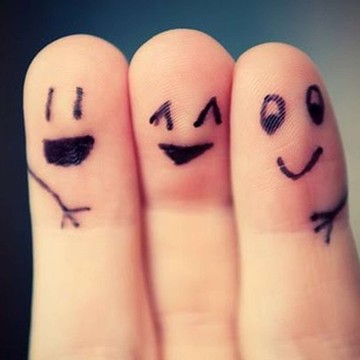
Jun 7, 2024 • 59min
Friendship
The HBS hosts discuss how friendships are forged, maintained, and sometimes broken. In The Politics of Friendship, Jacques Derrida invokes a statement originally attributed to Aristotle: “My Friends, there are no friends," capturing something that seems to be fundamental about friendship. Friendship is essential to human thriving, but also difficult, if not impossible, to attain and maintain. We make all sorts of fine distinctions between friends, "best" friends, acquaintances, colleagues or "work" friends, etc. But what makes someone that you know a "friend" vs. an acquaintance or a colleague? Is that a permanent condition? What do we owe to a friend, and what do they ow us? Is there a political dimension to friendship? This week, friends of the podcast, we're talking about friendship: how it's forged, how it is nurtured and sustained, and how it is broken.Full episode notes at this link:https://hotelbarpodcast.com/podcast/episode-139-friendship-------------------If you enjoy Hotel Bar Sessions podcast, please be sure to subscribe and submit a rating/review! Better yet, you can support this podcast by signing up to be one of our Patrons at patreon.com/hotelbarsessions!Follow us on Twitter/X @hotelbarpodcast, on Facebook, on TikTok, and subscribe to our YouTube channel!
★ Support this podcast on Patreon ★

May 31, 2024 • 55min
Personhood
What is a person? What is a thing? And what difference does that difference make? Although we tend to use the terms "person" and "human being" interchangeably, it hasn't always been the case that all human beings were considered (moral or legal) persons, nor is the case today that all persons are human beings. Here in the United States, corporations are considered legal persons, and in several countries across the world, natural beings (like rivers, lakes, and ecosystems) have also been granted "personhood" status. Many people treat their pets as moral persons. Even when we don't call out cats and dogs "persons," we certainly distinguish them from other things (like a toaster!).Social robots and generative AI have only amplified our confusion about "personhood" recently. Do we need more categories to adequately distinguish our moral and legal obligations to the beings with which we share our world?Full episode notes available at this link: https://hotelbarpodcast.com/podcast/episode-138-personhood-------------------If you enjoy Hotel Bar Sessions podcast, please be sure to subscribe and submit a rating/review! Better yet, you can support this podcast by signing up to be one of our Patrons at patreon.com/hotelbarsessions!Follow us on Twitter/X @hotelbarpodcast, on Facebook, on TikTok, and subscribe to our YouTube channel!
★ Support this podcast on Patreon ★

May 24, 2024 • 55min
Originality
What's so special about originality?Today, originality is being challenged in so many ways: comedians “stealing” jokes, cultural appropriation, remixes, not to mention the myriad ways that generative artificial intelligence has made plagiarism of all kinds possible. We value originality over imitation, creativity over copying, and novelty over the “same old, same old.” But, why is originality such a cherished value? Is it even possible, or is everything just a remix or a copy? We bring new, never before heard, insights to the topic of originality this week!Full episode notes available at this link:https://hotelbarpodcast.com/podcast/episode-136-originality-------------------If you enjoy Hotel Bar Sessions podcast, please be sure to subscribe and submit a rating/review! Better yet, you can support this podcast by signing up to be one of our Patrons at patreon.com/hotelbarsessions!Follow us on Twitter/X @hotelbarpodcast, on Facebook, on TikTok, and subscribe to our YouTube channel!
★ Support this podcast on Patreon ★
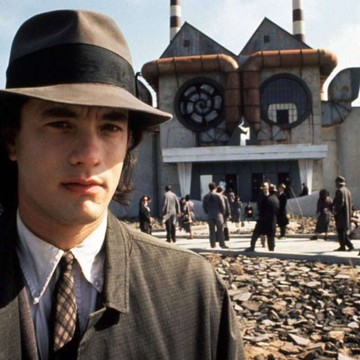
May 17, 2024 • 53min
HBS Goes to the Movies: "Joe Versus the Volcano" (1990)
Michael Norton explains why “Joe Versus the Volcano” is the perfect existentialist film.Continuing our tradition of going to the movies for the first episode of teach new season, we watch the 1990 film Joe vs. The Volcano with Michael Norton from the University of Arkansas, Little Rock. Michael has an argument that the movie is the perfect existentialist film. Is he right? Full episode notes available at this link:https://hotelbarpodcast.com/podcast/hbs-goes-to-the-movies-joe-versus-the-volcano-1990/-------------------If you enjoy Hotel Bar Sessions podcast, please be sure to subscribe and submit a rating/review! Better yet, you can support this podcast by signing up to be one of our Patrons at patreon.com/hotelbarsessions!Follow us on Twitter/X @hotelbarpodcast, on Facebook, on TikTok, and subscribe to our YouTube channel!
★ Support this podcast on Patreon ★
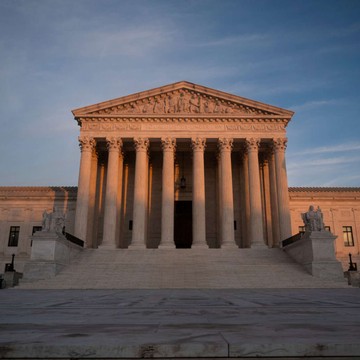
May 10, 2024 • 23min
MINIBAR EPISODE: Will The Courts Save Democracy?
The HBS hosts cross-examine the courts. Former President Trump is currently dividing his time between the campaign trail and the courtroom. Some Americans are outraged by what they view to be targeted prosecutions by biased and overzealous District Attorneys, while others view the same events as a lifelong con man getting his just deserts. Fascinatingly, both sides seem to be putting a lot of faith in the courts to "save democracy."In this brief MINIBAR episode, we chat about the limits of the courts and what is gained (or lost) by relying on them so heavily to save us.NOTE: This will be our last MINIBAR episode between seasons. Make sure to tune in next week, Friday, May 17, for the first episode of Season 10!Full episode notes available at this link:https://hotelbarpodcast.com/podcast/minibar-episode-will-the-courts-save-democracy-------------------If you enjoy Hotel Bar Sessions podcast, please be sure to subscribe and submit a rating/review! Better yet, you can support this podcast by signing up to be one of our Patrons at patreon.com/hotelbarsessions!Follow us on Twitter/X @hotelbarpodcast, on Facebook, on TikTok, and subscribe to our YouTube channel!
★ Support this podcast on Patreon ★


